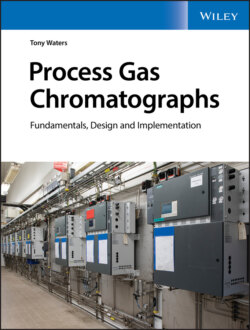Читать книгу Process Gas Chromatographs - Tony Waters - Страница 11
ОглавлениеPreface
Welcome to the world of Process Gas Chromatography!
This book focuses on the Process Gas Chromatograph (PGC). There are dozens of fine books on the science of gas chromatography but few on the technology of the process instrument. I found only two previous books dedicated to online gas chromatographs (Huskins 1977; Annino and Villalobos 1992).
Process gas chromatographs are complex instruments, and the people that design and operate them need special knowledge and unique skills. With that in mind, I designed the book to serve the needs of the journeyman analyzer technician, the process instrument engineer, and the process analyzer specialist.
PGC is a practical technology, and this is a practical book. It's an effective classroom training manual for those currently learning the art and a handy reference manual for those already practicing it.
Chapters are deliberately compact, suitable for a weekly reading program or as focused lessons in an educational course. Each chapter ends with a summary of knowledge gained and a self‐assessment quiz with answers provided. In addition, there are nine optional test questions for students; three easy, three moderate, and three challenging.
Why is such a book necessary?
Anyone working in the fluid processing industries knows that their knowledge base is in full flight. Due to staffing reductions and mass retirements our industry is losing decades of hard‐won experience.
Walter Jennings and Colin Poole recently expressed this situation rather well (Jennings and Poole 2012, 72):
This [automation of gas chromatographs] has led to a continuing decline in the expertise of the average practicing chromatographer from the mid‐1980s to the present time. This can be perilous, because everything from column selection to trouble‐shooting skills is based on a fundamental knowledge of chromatographic principles, the absence of which degrades the quality and usefulness of the information acquired by these instruments. To address these problems requires a massive educational effort before the knowledge is lost and the usefulness of gas chromatography to decision makers is called into question.
There can be no clearer call to justify this book. While the authors were writing to laboratory chemists, those working on process gas chromatographs also need a fundamental knowledge of chromatographic principles presented in a way that facilitates a massive educational effort. This textbook sets out to satisfy those needs. It's primarily written for process analyzer engineers and technicians but should be helpful to anyone using or maintaining a process gas chromatograph.
To succeed in its mission, a book needs to so excite readers that they want to read more. It should be so useful that they immediately return to it when they need information. Yet the average book on gas chromatography is abysmally boring and poses an intellectual challenge even to post‐doctoral scientists, let alone the lonely guy faced with fixing a broken process chromatograph at midnight.
This text teaches the fundamental knowledge of process gas chromatography by encouraging the reader to think critically about what is happening in the instrument, mostly without recourse to analogy or math. It also describes some practical procedures for design or troubleshooting.
So, here you have it. A clear yet detailed book that is ideal for classroom instruction, private study, or distance learning. Focused chapters unfold the technology of a process gas chromatograph to an engineer or technician who may have no previous experience of the technique. The content is basic, yet thorough, so it should meet the needs of many readers.
I'm glad that you're here. I hope you enjoy the book!
Tony Waters
Atascadero, California
January 2020
References
Cited
1 Annino, R. and Villalobos, R. (1992). Process Gas Chromatography. Research Triangle Park, NC: Instrument Society of America.
2 Huskins, D.J. (1977). Gas Chromatographs as Industrial Process Analyzers. New York, NY: Pergamon Press.
3 Jennings, W.G. and Poole, C.F. (2012). Milestones in the development of gas chromatography. In: Gas Chromatography (ed. C.F. Poole), 1–18. Oxford, UK: Elsevier.
